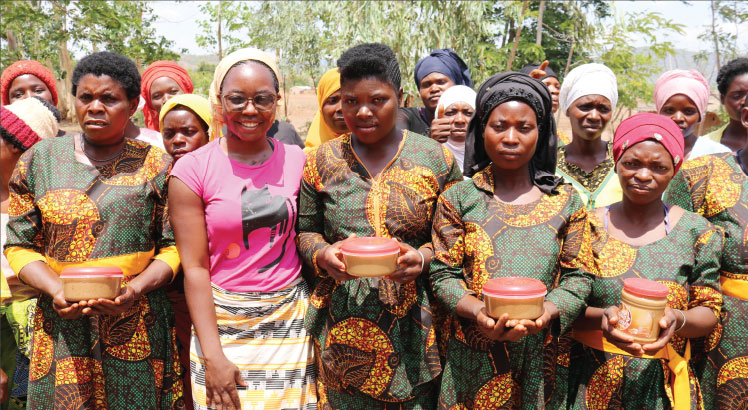From family problem to community solution
When 28-year-old Jacqueline Banda produced her first bottle of chilli pepper in 2019, it was because her cousin was sick. He had lost appetite and his body’s immunity was deteriorating.
“Whatever food was brought before him, he would not eat and yet he was wasting,” says Jacqueline, from Chinama Village, Traditional Authority Bwananyambi in Mangochi.
Jacqueline realised that the only thing the family had not tried was chilli. In a desperate effort to save her cousin’s life, she plucked and ground a cupful of chillis from her grandfather’s backyard garden. She then bought garlic from the village market and crushed it into powder. This she added to the chilli.
“The aroma was astonishing,” she says. “When it was added to the food, my cousin loved it. For the first time in many days, the patient enjoyed his meal and finished all the food.”

With the appetite rekindled, what remained was to find a solution to the ailing immune system.
From her brief stint working with a livelihoods project, Jacqueline had learned how nutritious, peanut butter can be.
In no time, the cousin was enjoying both chilli-seasoned food and peanut butter Jacqueline had made from local resources. Soon, the patient was strong again and back on his feet.
Jacqueline, a graduate of Business Administration from Shimla University in India, noticed a business opportunity and started producing her own peanut butter in bulk and selling it in town where she stays.
All this, she did with no proper training in food processing, but from what she learned from the Internet.
Her first proper food processing training came in October when Lilongwe University of Agriculture and Natural Resources (Luanar) offered a short course in peanut butter production.
The three-week training was supported by Strengthening Higher Education Access in Malawi Activity (Sheama). Sheama is implemented by Arizona State University with funding and technical support from the US Agency for International Development (USAid) to increase employable and skilled workforce.
Sheama has partnered five public universities to offer quality industry-driven online distance learning programmes (ODeL). They include Luanar, Mzuzu University, University of Malawi, Malawi University of Science and Technology and Malawi University of Business and Applied Sciences.
The project also provides scholarships to needy students enrolled with the five universities under online distance education.
Through the course, Jacqueline learned about types of groundnuts and their nutritional content, health hazards of aflatoxins and the right season to buy groundnuts for maximum profit.
The impact Jacqueline’s peanut butter had on her cousin in 2019 did not go unnoticed and individuals from her community would come to learn from her.
This has made peanut butter popular in the community and beyond.
Jacqueline is now training 73 women in peanut butter production.
Although the area produces enough groundnuts and soya beans, the products are rarely consumed, but sold to traders. Jacqueline encourages the women to consume some and sell the surplus after adding value to make profit.
“Because they are many, I train them in three groups. Sometimes they produce more than they need and therefore sell the surplus peanut at the market for K100 per spoon,” she says.
Among others, she trains mothers to give their children and pregnant women nutritious food products so that they give birth to strong babies.
“They believe all this because they witnessed with their eyes how same recipes helped my cousin,” she explains.
And because there is demand for peanut butter in the area, Jacqueline has extended her nutrition lessons to cover business management skills.
“We listen to her and do what she instructs us and because of the financial benefits, we plan to rent land where we can grow chilli and groundnuts for processing,” explains one of the women, Nuya Majoni, 48.
With her new qualifications in peanut butter production, Jacqueline also produces chilli sauce under Jeyie brand.
She sells Jeyie sauce and peanut butter door-to-door in Mangochi township.
She produces 100 bottles of peanut butter per month, but could produce up to 1 000 bottles if she mechanised production.
For chilli, she currently produces up to 500 bottles a month, but could hit 10 000 with good equipment she cannot presently afford.
On November 29 this year, Jacqueline participated in the Women in Agribusiness pitch competition, hoping to win $25 000 to invest in a maize mill for porridge flour production, a peanut butter machine and chilli packaging machine. Unfortunately, she only made it to the second round.
Sheama workforce development specialist Emmanuel Magomero says Jacqueline’s achievement is in line with the project’s main objective to increase Malawi’s skilled and employable workforce.
He says: “She is not only focusing on job seeking, she has ventured into job creation through entrepreneurship.
“More interesting is the use of her personal resources to reach out to her community with solutions. This is a huge achievement and a good social enterprise.”
Registered with the Registrar of Companies as Jeyie Foods, her dream is to invest in machinery for mass production and to be certified by the Malawi Bureau of Standards so she can start supplying supermarkets.
The Malawi 2063 development agenda places emphasis on achieving a healthy and productive nation. Women from Bwananyambi in Mangochi could already be on the path towards that goal and, all thanks to one of their own whose family problem has become a blessing in disguise.






One Comment